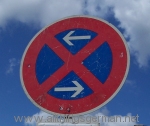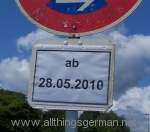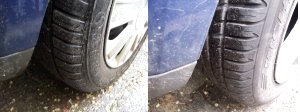This road sign means that you cannot park or wait on the side of the road where the sign is, on the sides of the sign pointed to by the arrow:

It is usually placed at the side of the road so that the sign is parallel to the road with the arrow pointing left in the direction of the traffic. With both arrows you cannot park on either side of it.
Somewhere there is usually another one with a single arrow to mark the end of the restriction, and you often see this sign in turning circles on housing estates.
If the measure is only temporary, then it has a sign below with the effective dates:

So I was quite confused the other day when I wanted to park in this road: [Read more…]

